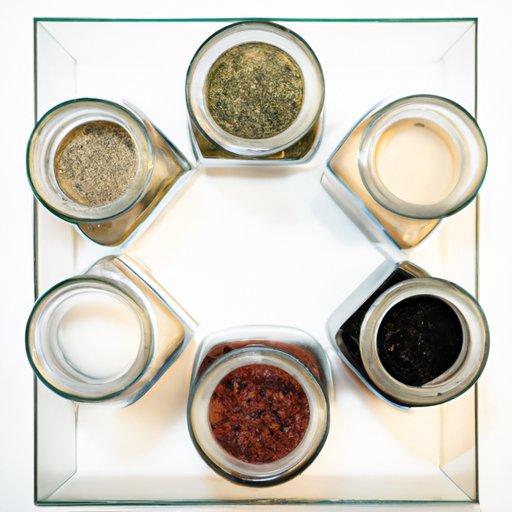
Introduction
Have you ever experienced a loss of taste or smell? Whether it’s due to a cold, sinus infection, or even COVID-19, losing these senses can be frustrating. Taste and smell are critical senses that enhance our enjoyment of food and help us detect danger. In addition to affecting our day-to-day lives, losing these senses can also lead to unintended weight loss or overeating. But don’t worry, there are numerous techniques and remedies to get your taste and smell back! In this guide, we’ll provide seven surprising techniques, a beginner’s guide, tips and tricks, a list of home remedies, simple habits to adopt, the science behind taste and smell, and expert opinions and personal experiences.

7 Surprising Techniques to Regain Your Sense of Taste and Smell
Technique 1: Try zinc supplements
Zinc is critical to immune function and plays a vital role in the regeneration of taste buds and nerve cells that control our sense of smell. According to recent research, zinc supplements have been found to be effective in treating taste and smell disorders. You can take zinc supplements as lozenges, chewable tablets, or capsules. Consult your doctor regarding the correct dosage.
Technique 2: Use nasal sprays
Nasal sprays can help clear any blockages in the nasal passages due to congestion. Saline nasal sprays help moisturize the nose and remove irritants, making it easier to breathe and improve your sense of smell. Steroid nasal sprays treat nasal inflammation, open airways, and increase airflow to the nose, restoring your sense of smell.
Technique 3: Try aromatherapy
Aromatherapy can help stimulate your sense of smell. Try essential oils such as peppermint, lemon, or rosemary to help you smell and taste your food better. You can add these oils to a diffuser, inhale them directly from the bottle or add a few drops to a hot bath.
Technique 4: Use essential oils
In addition to aromatherapy, you can also use essential oils for cooking. Add a drop of peppermint or lemon essential oil to your meals to improve your sense of taste. However, remember to use essential oils sparingly as they are potent and can be overwhelming.
Technique 5: Brush your teeth and tongue regularly
Poor dental hygiene can affect your sense of taste. Brush your teeth and tongue twice a day to remove any lingering food particles that can dull your sense of taste and smell.
Technique 6: Drink more water
Dehydration can affect your sense of taste and smell. Drinking more water can help flush out any irritants in your nasal passages and prevent a dry mouth. Try drinking at least eight cups of water per day.
Technique 7: Try acupuncture
Acupuncture can help improve blood circulation, which can enhance the regeneration of nerve cells responsible for our sense of smell and taste. Certain acupuncture points can also stimulate those senses, improving your overall sense of well-being.
A Beginner’s Guide to Restoring Lost Taste and Smell
Explanation of the basics regarding taste and smell
Our taste buds can distinguish between five basic tastes: sweet, sour, bitter, salty, umami (savory). In contrast, our sense of smell is capable of detecting thousands of scents, making it the most critical component of taste. Together, they create flavor, enabling us to enjoy a wide range of foods.
Causes for losing taste and smell
Various factors can lead to a loss of taste and smell, including viral infections (like the common cold) or sinus infections, allergies, exposure to toxins, head injuries, aging, and some medications (e.g., antibiotics and antihistamines).
Overview of treatment options
There are numerous treatments for restoring lost taste and smell, including the use of medication and home remedies, surgical treatment for nasal polyps or tumors, or sensory training.
How to Get Your Taste and Smell Back: Tips and Tricks
Tip 1: Try smelling different scents
Practice smelling different scents, such as flowers, essential oils, or even your coffee in the morning. This can help stimulate the olfactory nerves in your nose and improve your sense of smell over time.
Tip 2: Experiment with various foods and spices
Try various foods and spices to get your taste buds excited. Experiment with new flavors you find appealing or revisit foods you haven’t had in a while to rediscover old favorites.
Tip 3: Train your sense of smell
Try sensory training to improve your sense of smell. You can purchase a sensory training kit online or make one at home. The kit involves common fragrances such as lavender or eucalyptus and helps you recognize different scents.
Tip 4: See a doctor for underlying health issues
If you experience significant changes in your sense of taste or smell, it’s essential to see a doctor. It can be the result of an underlying illness or infection, and diagnosing and treating the issue can help restore your senses.
Tip 5: Try different textures and temperatures
Experiment with different textures and temperatures to add variety to your meals. Eating a variety of texture and temperatures can enhance taste and create more enjoyment when eating.
The Ultimate List of Home Remedies for Improving Taste and Smell
Home remedy 1: Use apple cider vinegar
Apple cider vinegar is known for its strong flavor and acidic properties. Adding a few teaspoons to your food can help enhance your sense of taste.
Home remedy 2: Try ayurvedic remedies
Ayurvedic remedies, including ginger, turmeric, and garlic, can help improve your overall health and enhance your sense of taste and smell.
Home remedy 3: Use ginger
Ginger can help increase blood flow, which can stimulate the regeneration of taste buds and the nerve cells responsible for our sense of smell. Add grated ginger to your meals or sip on warm ginger tea.
Home remedy 4: Try different herbal teas
Herbal teas such as Chamomile, Peppermint, and Fennel can help soothe inflammation that can affect your sense of smell. These teas help keep your respiratory system clear and promote a healthy sense of smell as well as taste.
Home remedy 5: Use lemon juice
Lemon juice is acidic and gives a sour taste that can help stimulate your taste buds. Adding lemon juice to your favorite teas or salads can improve your sense of taste and create taste excitement.
5 Simple Habits to Help You Recover Your Lost Sense of Taste and Smell
Habit 1: Quit smoking
Smoking can significantly impair your sense of taste and smell. Quit smoking or avoid exposure to second-hand smoke if possible.
Habit 2: Improve your oral hygiene
Good oral hygiene, such as brushing your teeth and tongue after meals, can help remove lingering food particles that can affect your sense of taste and smell.
Habit 3: Exercise regularly
Exercise can improve circulation, aiding in the regeneration of nerve cells that control our sense of smell and taste. With the improvement of blood flow, the Zn receptors will be supplied with nutrients and oxygen, and hence, contributed to the regeneration of taste buds.
Habit 4: Increase your Vitamin A intake
Vitamin A is critical in maintaining the health and functionality of our taste buds and supporting the regeneration of our nerve cells. Consume food sources high in vitamin A such as spinach, sweet potatoes, and carrots.
Habit 5: Reduce stress
Stress can affect our sense of taste and smell. Find ways to manage stress and try stress-reducing activities such as meditation or yoga to improve these senses.
Discover the Science Behind Regaining Taste and Smell and How to Apply it in Your life
Explanation of the science behind taste and smell
Our sense of taste and smell is a complex process involving interactions between a myriad of receptors in our nose and taste buds. The regeneration of taste buds and the nerve cells responsible for our sense of smell requires a combination of nutrients, good oral hygiene, and healthy lifestyle choices.
How to implement these concepts in daily life
To improve your sense of taste and smell, incorporate healthy habits such as good oral hygiene, exercise, and a balanced diet with sources of zinc and vitamin A. Try some of the remedies featured in this guide, such as aromatherapy, essential oils, and sensory training. Partner with your doctor or a specialist to diagnose any underlying issues affecting your sense of taste and smell and the most effective path to take.
Top 7 Ways to Regain Your Sense of Taste and Smell: Expert Opinion and Personal Experience
Experts recommend incorporating a balanced diet, consistent exercise, good oral hygiene, and stress reduction as key ways of enhancing our taste and smell.
One individual shares, “I was pleasantly surprised to find that aromatherapy provided the kickstart I needed to regain my sense of smell after a sinus infection. Essential oils like peppermint and eucalyptus improved my nasal congestion and allowed me to breathe deeply, rediscovering long-forgotten scents.”
Conclusion
Losing your sense of taste and smell is a frustrating experience, but don’t give up hope. There are various techniques, tips, and remedies to help you regain your senses. Try incorporating a balanced diet, healthy habits such as exercise and good oral hygiene, and stress reduction techniques into your daily routine and explore remedies such as aromatherapy and sensory training. Work with your doctor to diagnose underlying issues that may be affecting your senses, and remember, be patient, and try different methods for regaining your sense of taste and smell.





